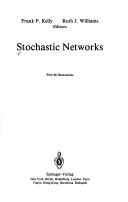The IMA Volumes in Mathematics and its Applications
1 primary work
Book 71
The proliferation of local and global communication networks for computer and human communication, the development of parallel computers with large numbers of processors and the design of flexible and robust manufacturing systems, have increased the understanding of queuing theory. While research on queuing networks uses many of the traditional...Read more
The proliferation of local and global communication networks for computer and human communication, the development of parallel computers with large numbers of processors and the design of flexible and robust manufacturing systems, have increased the understanding of queuing theory. While research on queuing networks uses many of the traditional queuing insights, it is more concerned with how network components interact than with detailed models of how an individual queue behaves. Topics discussed in this book include: the conditions for stability of multiclass queuing networks; the challenges reflected in the Brownian motion which is set both as a mathematical object and as a modelling paradigm; the usefulness of ideas from the interacting particle system world; the application of large deviation theory; and the developing connections with optimization and dynamical systems theory.
